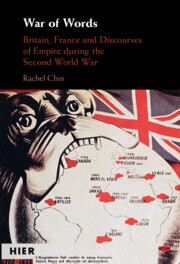Book contents
- War of Words
- War of Words
- Copyright page
- Dedication
- Contents
- Acknowledgements
- Abbreviations
- Introduction
- 1 From the Dunkirk Evacuations to the Franco-German Armistice
- 2 ‘The Real Question at Issue’
- 3 A Necessary Tragedy? The British Bombardments of the French Fleet at Mers El-Kébir
- 4 Vichy, the Free French and the Battle for Imperial Influence at Dakar in September 1940
- 5 Promises of Independence
- 6 Operation Torch
- 7 Independence on French Terms
- 8 Holding On to Empire
- Conclusion
- Bibliography
- Index
2 - ‘The Real Question at Issue’
British Policy and the French Fleet
Published online by Cambridge University Press: 07 July 2022
- War of Words
- War of Words
- Copyright page
- Dedication
- Contents
- Acknowledgements
- Abbreviations
- Introduction
- 1 From the Dunkirk Evacuations to the Franco-German Armistice
- 2 ‘The Real Question at Issue’
- 3 A Necessary Tragedy? The British Bombardments of the French Fleet at Mers El-Kébir
- 4 Vichy, the Free French and the Battle for Imperial Influence at Dakar in September 1940
- 5 Promises of Independence
- 6 Operation Torch
- 7 Independence on French Terms
- 8 Holding On to Empire
- Conclusion
- Bibliography
- Index
Summary
This chapter explores the future of the French fleet in the wake of the Franco-German armistice. It focuses upon the fleet’s material and symbolic importance on both sides of the Channel. For Pétain’s newly minted government, the fleet was a mark of international prestige, a measurement of sovereignty and the guardian of the empire. For Britain, it was a strategic and symbolic liability. Its neutralisation would send a powerful message of Britain’s wartime resolve to audiences in Britain, metropolitan France and the United States.
Operation Catapult was conceived to remove the French fleet as a military threat, illustrate British power and justify an armed incursion against an erstwhile ally. By examining the content and proposed timing of draft press releases, which have not been discussed in any academic literature to date, this chapter reveals how policy-makers dealt with questions of violence and morality in wartime. It explores how these normative concepts precluded certain actions while allowing others. Finally, it assesses how British leaders justified action against the French fleet as both inevitable and necessary for the successful prosecution of the war.
- Type
- Chapter
- Information
- War of WordsBritain, France and Discourses of Empire during the Second World War, pp. 56 - 75Publisher: Cambridge University PressPrint publication year: 2022

